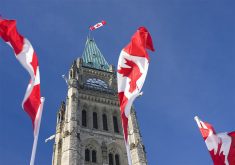A recent PricewaterhouseCoopers-sponsored article in a national newspaper proclaimed the “benefits” of employing self-styled experts in something called environmental, social and governance corporate disclosure.
The firm warns not using their services may put executives offside with increasingly strict regulatory authorities, institutional investors and politicians. Yet PwC’s advertorial points create more questions than answers.
First, what is ESG?
“E” stands for environment, “S” for social justice, and “G” for corporate governance. ESG funds invest in companies that oppose conventional hydrocarbon energies, embrace unionization and promote racial and gender equity over merit in staffing and board selection.
Read Also

Farm groups are too amiable with the federal government
Farm groups and commodity groups in Canada often strike a conciliatory tone, rather than aggressively criticizing the government.
It’s essentially a back-door form of social credit scoring in which financial institutions invest in companies that incorporate an “uber progressive” left-wing policy agenda into their operations.
Mixing politics into business operations is problematic.
For instance, there are no firm standardized criteria to evaluate and score ESG for corporate performance. Current trends in such scoring bode ill for independent, autonomous decision-making for corporate managers, boards of directors and shareholders.
ESG’s goal is the redirection of investment behaviour: transforming coal, oil, and natural gas as assets to the “alternatives” of wind and solar. Coerced transformation problems abound — first being the investment of trillions of dollars in wind turbines, solar panels and grid connectivity. Crucial energy storage for such intermittent sources can be very expensive and is usually evaded when connecting to the grid. Climate models, though unreliable, do not project any future that, as of now, would be impossible to adapt to.
ESG doctrine implies that firms are irresponsible actors, polluting extravagantly and heedlessly, and committing severe crimes against staff, customers, suppliers and the communities within which they operate, including indigenous ones. ESG advocates suspect companies engage in corrupt and autocracy-aiding practices, with managements either unaccountable and/or lavishly compensated, while insufficiently diverse in ethnic, (dis-)ability, gender or other aspects of identity politics.
While some ESG managers are paid more than seems reasonable, boards and shareholders are increasingly getting hold of the problem.
The other ESG issues are invalid. Firms obey strict laws regarding governance, fraud, accountability, bribery and abetting dictatorships. Violating them could cost billions of dollars or even cause bankruptcy, as occurred with Enron, Wirecard and FTX.
The risks from GHG emissions or government actions to abate them are included in financial reporting, as are workplace diversity plans. Customer and community relations engagement is just smart management.
Corporate managers should not be required to make exhaustive, costly and questionable ESG disclosure. Institutional investors acting on Canadians’ behalf should not place billion-dollar bets on ESG.
Individual retirement accounts could make this problem go away, leaving account holders to put their money into ESG-oriented funds or stocks if they wish. They should not be forced to do so, now or ever.
The largest institutional fund managers in Canada are entrusted by provincial, federal or local governments with investing the funds of working and retired employees or citizens to fully fund current and future pension income obligations.
ESG-oriented funds, or related ESG investments, have done especially badly recently. The companies they favour, including China-friendly ones, green energy, IT, and others avoiding fossil fuels, have cratered, whereas oil and gas firms have soared. ESG is obviously against the interests of pension plan members or the public’s informed consent.
ESG is a covert attempt to impose progressive state policy preferences on the private sector economy. It will lower pension returns and living standards. Canada’s governments and policymakers should reject this mixing of politics into corporate operations due to its many practical problems.
Ian Madsen is the senior policy analyst at the Frontier Centre for Public Policy. This item was first published on the organization’s website at fcpp.org, and was edited for length.















